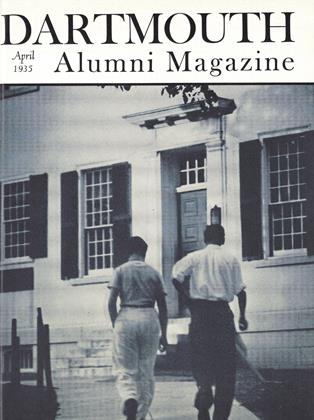By Frank W. Halliday '01. Roberts & Cos., Washington, D. C. pp. 63.
"Frank W. Halliday of the class of 1901 is Lieutenant Colonel in the United States Army, on the staff of the Judge Advocate General, and now stationed in Washington. Those who knew him in college as a student, football player, debater and friend will feel a special interest in this little book of verse which will bring him vividly to mind. Through the lines peeps the sensitive Celtic imagination of his Scottish ancestry. It was apparent in personal contact, and in the metaphor and simile with which he enriched his debates. This book shows it disciplined to expression in verse form.
The lines do not show what sometimes in modern verse seems almost a struggle to be profound or complex, to proclaim a wisdom greater than falls to the lot of any but the elect, to disclose emotions not often experienced in the hearts of men. Though Halliday's verses often touch the intellect with some turn of phrase, they can be understood and enjoyed at a first reading. That is not to say they are superficial, but that they are broadly human, simple, direct.
For five years Colonel Halliday served as Professor of Law at the United States Military Academy at West Point some-what derivative from Dartmouth and there the vigorous young life of the cadets stirred the responses that youth ever stirs in the older. Some of the poems express this going out of the heart to the young, appreciating the refreshment they give, the feeling that life and love, endeavor and honor, will not only persist, but will, perchance, we hope, enlarge when we the older no longer inhabit the world. Some of the poems reflect, too, the special beauty of the earth at one of its most beautiful places, where the river sweeps around the jutting promentories of the Point.
But by no means all the collection is about West Point and West Pointers. It ranges widely in the field of life. Halliday asks with Cyrano de Bergerac, "Parlez vous de mon nez?" and under the title "Follow My Nose" ends with: "I want it known by friends and foes That I will keep its perfect pose In my own business or a rose." Halliday, along with Carlyle, perceives that the individual had damn well better decide to accept the universe. Among the expressions in The Crow's Nest of this perception appears: "How vain regret, If sun have set, With clever plans evolved, When at the last, All labor past, Our biggest problems are unsolved." But the acceptance is to be with courage and cheer, for: "In spite of glooms and all that glooms may do The world is richly full of happy days."
Members of the faculty and alumni body are earnestly requested to send copies of all of their books, monographs, magazine articles and reprints to Baker Library, attention Harold G. Rugg, in order that these may be mentioned in forthcoming numbers of the MAGAZINE. Such material is also desired for the Archives Room in the Library where it is properly catalogued and permanently filed.
 View Full Issue
View Full Issue
More From This Issue
-
 Article
ArticleHANOVER BROWSING
April 1935 By Herbert F. West '22 -
 Article
ArticleSTABILIZATION BY SPECIE PAYMENTS
April 1935 By Edward Tuck '62 -
 Class Notes
Class NotesClass of 1908
April 1935 By L. W. Griswold -
 Class Notes
Class NotesClass of 1910
April 1935 By Harold P. Hinman -
 Class Notes
Class NotesClass of 1918
April 1935 By Allan C. Gottschaldt -
 Class Notes
Class NotesClass of 1929
April 1935 By F. William Andres
Books
-
 Books
BooksThe Land Was Theirs
September 1976 By Alexander G. Medlicott Jr. '50 -
 Books
BooksON COPIA OF WORDS AND IDEAS.
JUNE 1964 By JOHN W. ZARKER -
 Books
BooksPop Fiction
MARCH|APRIL 2019 By JULIA M. KLEIN -
 Books
BooksTHE TELEPHONE BOOTH INDIAN
May 1942 By Kenneth A. Robinson -
 Books
BooksA Troubling Read
MAY 1978 By MICHAEL DORRIS -
 Books
BooksMENTION MY NAME IN HAWAII!!!!
November 1973 By ROBERT O. WHITE'54

